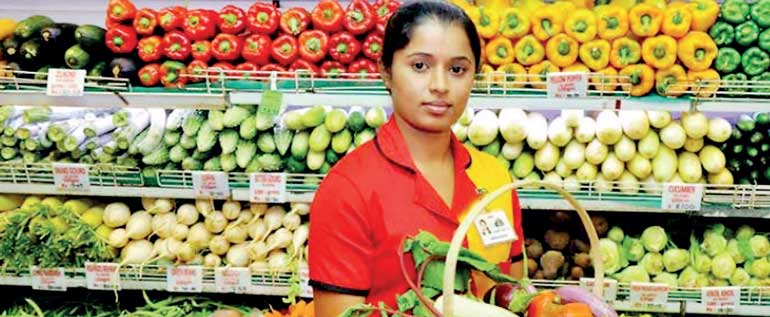Wednesday Feb 18, 2026
Wednesday Feb 18, 2026
Tuesday, 7 November 2017 00:00 - - {{hitsCtrl.values.hits}}

Fitch Ratings says the modern grocery retail sector has strong growth prospects helped by stable balance sheets of leading industry firms.
It expects the modern grocery retail sector in Sri Lanka to expand in the mid-teens in the medium term, supported by aggressive expansion and growth in same-store sales.
Increasing per capita income and rising urbanisation should make modern grocery retail more affordable and accessible to a larger portion of the population. Sri Lanka’s supermarket penetration is still around 15% compared to 30% for regional peers with similar social and economic characteristics, which indicates the potential for the industry to grow.
Fitch believes more people are now willing to shop at supermarkets and hypermarkets compared with five years ago, helped by the competitive prices offered by modern retailers, which are equal to or even below the prices of traditional retailers.
Modern retailers are able to source products at low prices due to their larger scale while most of the Fast-Moving Consumer Goods (FMCG) they sell are subject to maximum retail prices which reduce the price difference with traditional retailers. Fitch believes customers will gradually prioritise convenience and quality over price amid rising income levels, which also bodes well for modern grocery retail.
Fitch expects the credit profiles of the three largest operators of modern grocery retail chains in Sri Lanka − Cargills Food City, Keells Super and Arpico (the retail arm of Richard Pieris & Company PLC (A(lka)/Stable) − to remain stable in the medium term despite high capex.
It expects strong top line growth and stable profit margins to help generate sufficient operating cash to meet the companies’ expansion needs. Consequently it expects gross leverage (defined as lease adjusted gross debt/EBITDAR) of the companies to remain in the 2.0x-3.0x range in the medium term until cash inflows from new stores allow meaningful deleveraging.
In addition, all three companies, which run supermarkets and hypermarkets, are supported by strong parents that have diversified sector exposures and strong access to funding.
Fitch believes the companies that focus on hypermarket formats with extensive product portfolios are likely to make the most gains in urban areas, where customers prioritise convenience, variety and quality. It does not expect the established players to aggressively expand outside of the Western Province in the near term, but provinces such as North Central, North Western and Uva provide strong growth potential as they are supported by high per capita income growth and low supermarket penetration.
“We expect growth in the Western province to stagnate in the medium term, especially for companies that focus on FMCG products, as demand for such products tends to be inelastic,” Fitch said.
Fitch also does not expect competition in the modern retail sector to be much changed by new entrants in the medium term. The incumbents have secured a mix of owned and leased properties in prime locations in main cities that would be difficult for a new player to replicate at a time when property prices and rents are rising. A potential entrant will also have to build strong relationships with suppliers to secure lower costs, which could take years. The significant investment required to set up sophisticated warehousing and transportation facilities could also deter new entrants in the absence of third parties that provide such services.
Fitch believes modern grocery retailers will benefit from online sales only in the long-term because delivery costs are likely to remain high compared to the average basket-size in the next three to four years. Positively, the established operators have the necessary infrastructure, such as extensive warehousing and transportation facilities, to cater to this market. At the same time, rising internet penetration, increased use of credit cards, and a preference for convenience amid rising income levels have created a conducive environment for online retail.
Noting regulatory risks remain high, Fitch believes regulatory changes in the form of taxes and price controls are the key risk for the industry. The industry was affected by previous ad-hoc changes to value added tax (VAT) that significantly reduced sector margins. The large modern retailers were affected the most as the VAT is imposed on high revenue generators. It believes the tax environment has improved for modern retailers with the removal of deemed VAT – a sales tax that retailers were not allowed to pass on to consumers. However even a slight change in taxes could have a material impact on profitability, which is already thin.
From time to time the government has imposed price ceilings on essential items which have forced supermarkets to sell existing stocks at lower margins or losses. Price controls have also led to supply shortages and low quality products hitting the market, but the impact of such actions have been short term and negligible on the credit profiles of the large grocery retail operators.